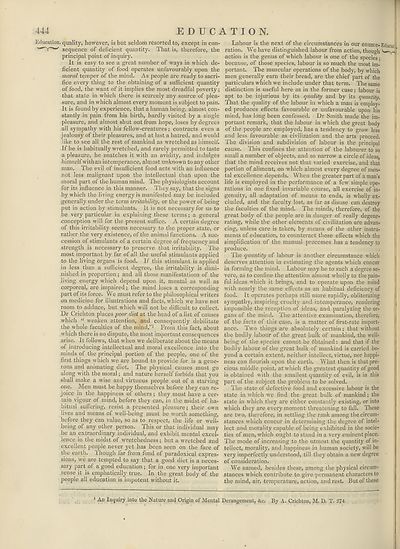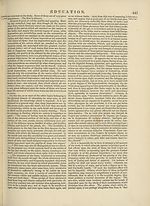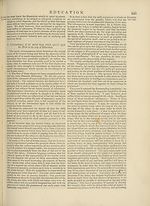Encyclopaedia Britannica > Volume 8, DIA-England
(454) Page 444
Download files
Complete book:
Individual page:
Thumbnail gallery: Grid view | List view

444
Education
Y
EDUCATION.
• quality, however, is but seldom resorted to, except in con¬
sequence of deficient quantity. That is, therefore, the
principal point of inquiry.
It is easy to see a great number of ways in which de¬
ficient quantity of food operates unfavourably upon the
moral temper of the mind. As people are ready to sacri¬
fice every thing to the obtaining of a sufficient quantity
of food, the want of it implies the most dreadful poverty;
that state in which there is scarcely any source of plea¬
sure, and in which almost every moment is subject to pain.
It is found by experience, that a human being, almost con¬
stantly in pain from his birth, hardly visited by a single
pleasure, and almost shut out from hope, loses by degrees
ail sympathy with his fellow-creatures; contracts even a
jealousy of their pleasures, and at last a hatred, and would
like to see all the rest of mankind as wretched as himself.
If he is habitually wretched, and rarely permitted to taste
a pleasure, he snatches it with an avidity, and indulges
himself with an intemperance, almost unknown to any other
man. The evil of insufficient food acts with an influence
not less malignant upon the intellectual than upon the
moral part of the human mind. The physiologists account
for its influence in this manner. They say, that the signs
by which the living energy is manifested may be included
generally under the term irritability, or the power of being
put in action by stimulants. It is not necessary for us to
be very particular in explaining these terms; a general
conception will for the present suffice. A certain degree
of this irritability seems necessary to the proper state, or
rather the very existence, of the animal functions. A suc¬
cession of stimulants of a certain degree of frequency and
strength is necessary to preserve that irritability. The
most important by far of all the useful stimulants applied
to the living organs is food. If this stimulant is applied
in less than a sufficient degree, the irritability is dimi¬
nished in proportion; and all those manifestations of the
living energy which depend upon it, mental as well as
corporeal, are impaired; the mind loses a corresponding
part of its force. We must refer to the philosophical writers
on medicine for illustrations and facts, which we have not
room to adduce, but which will not be difficult to collect.
Dr Crichton places poor diet at the head of a list of causes
which “ weaken attention, and consequently debilitate
the whole faculties of the mind.”1 From this fact, about
which there is no dispute, the most important consequences
arise. It follows, that when we deliberate about the means
of introducing intellectual and moral excellence into the
minds of the principal portion of the people, one of the
first things which we are bound to provide for is a gene¬
rous and animating diet. The physical causes must go
along with the moral; and nature herself forbids that you
shall make a wise and virtuous people out of a starving
one. Men must be happy themselves before they can re¬
joice in the happiness of others ; they must have a cer¬
tain vigour of mind, before they can, in the midst of ha¬
bitual suffering, resist a presented pleasure; their own
lives and means of well-being must be worth something,
before they can value, so as to respect, the life or well¬
being of any other person. This or that individual may
be an extraordinary individual, and exhibit mental excel¬
lence in the midst of wretchedness; but a wretched and
excellent people never yet has been seen on the face of
the earth. Though far from fond of paradoxical expres¬
sions, we are tempted to say that a good diet is a neces¬
sary part of a good education; for in one very important
sense it is emphatically true. In the great body of the
people all education is impotent without it.
Labour is the next of the circumstances in our enume-Educat
ration. We have distinguished labour from action, thouo'h Wy-
action is the genus of which labour is one of the species;
because, of those species, labour is so much the most im¬
portant. The muscular operations of the body, by which
men generally earn their bread, are the chief part of the
particulars which we include under that term. The same
distinction is useful here as in the former case; labour is
apt to be injurious by its quality and by its quantity.
That the quality of the labour in which a man is employ¬
ed produces effects favourable or unfavourable upon his
mind, has long been confessed. Dr Smith made the im¬
portant remark, that the labour in which the great body
of the people are employed, has a tendency to grow less
and less favourable as civilization and the arts proceed.
The division and subdivision of labour is the principal
cause. This confines the attention of the labourer to so
small a number of objects, and so narrow a circle of ideas,
that the mind receives not that varied exercise, and that
portion of aliment, on which almost every degree of men¬
tal excellence depends. When the greater part of a man’s
life is employed in the performance of a few simple ope¬
rations in one fixed invariable course, all exercise of in¬
genuity, all adaptation of means to ends, is wholly ex¬
cluded, and the faculty lost, as far as disuse can destroy
the faculties of the mind. The minds, therefore, of the
great body of the people are in danger of really degene¬
rating, while the other elements of civilization are advan¬
cing, unless care is taken, by means of the other instru¬
ments of education, to counteract those effects which the
simplification of the manual processes has a tendency to
produce.
The quantity of labour is another circumstance which
deserves attention in estimating the agents which concur
in forming the mind. Labour may be to such a degree se¬
vere, as to confine the attention almost wholly to the pain¬
ful ideas which it brings, and to operate upon the mind
with nearly the same effects as an habitual deficiency of
food. It operates perhaps still more rapidly, obliterating
sympathy, inspiring cruelty and intemperance, rendering
impossible the reception of ideas, and paralyzing the or¬
gans of the mind. The attentive examination, therefore,
of the facts of this case, is a matter of first-rate import¬
ance. Two things are absolutely certain; that without
the bodily labour of the great bulk of mankind, the well¬
being of the species cannot be bbtained: and that if the
bodily labour of the great bulk of mankind is carried be¬
yond a certain extent, neither intellect, virtue, nor happi¬
ness can flourish upon the earth. What then is that pre¬
cious middle point, at which the greatest quantity of good
is obtained with the smallest quantity of evil, is in this
part of the subject the problem to be solved.
The state of defective food and excessive labour is the
state in which we find the great bulk of mankind; the
state in which they are either constantly7 existing, or into
which they are every moment threatening to fall. These
are two, therefore, in settling the rank among the circum¬
stances which concur in determining the degree of intel¬
lect and morality capable of being exhibited in the socie¬
ties of men, which ought to stand in a very eminent place.
The mode of increasing to the utmost the quantity of in¬
tellect, morality, and happiness in human society, will be
very imperfectly understood, till they7 obtain a new degree
of consideration.
We named, besides these, among the physical circum¬
stances which contribute to give permanent characters to
the mind, air, temperature, action, and rest. But of these
1 An Inquiry into the Nature and Origin of Mental Derangement, &c. By A. Crichton, M. D. T. 274.
Education
Y
EDUCATION.
• quality, however, is but seldom resorted to, except in con¬
sequence of deficient quantity. That is, therefore, the
principal point of inquiry.
It is easy to see a great number of ways in which de¬
ficient quantity of food operates unfavourably upon the
moral temper of the mind. As people are ready to sacri¬
fice every thing to the obtaining of a sufficient quantity
of food, the want of it implies the most dreadful poverty;
that state in which there is scarcely any source of plea¬
sure, and in which almost every moment is subject to pain.
It is found by experience, that a human being, almost con¬
stantly in pain from his birth, hardly visited by a single
pleasure, and almost shut out from hope, loses by degrees
ail sympathy with his fellow-creatures; contracts even a
jealousy of their pleasures, and at last a hatred, and would
like to see all the rest of mankind as wretched as himself.
If he is habitually wretched, and rarely permitted to taste
a pleasure, he snatches it with an avidity, and indulges
himself with an intemperance, almost unknown to any other
man. The evil of insufficient food acts with an influence
not less malignant upon the intellectual than upon the
moral part of the human mind. The physiologists account
for its influence in this manner. They say, that the signs
by which the living energy is manifested may be included
generally under the term irritability, or the power of being
put in action by stimulants. It is not necessary for us to
be very particular in explaining these terms; a general
conception will for the present suffice. A certain degree
of this irritability seems necessary to the proper state, or
rather the very existence, of the animal functions. A suc¬
cession of stimulants of a certain degree of frequency and
strength is necessary to preserve that irritability. The
most important by far of all the useful stimulants applied
to the living organs is food. If this stimulant is applied
in less than a sufficient degree, the irritability is dimi¬
nished in proportion; and all those manifestations of the
living energy which depend upon it, mental as well as
corporeal, are impaired; the mind loses a corresponding
part of its force. We must refer to the philosophical writers
on medicine for illustrations and facts, which we have not
room to adduce, but which will not be difficult to collect.
Dr Crichton places poor diet at the head of a list of causes
which “ weaken attention, and consequently debilitate
the whole faculties of the mind.”1 From this fact, about
which there is no dispute, the most important consequences
arise. It follows, that when we deliberate about the means
of introducing intellectual and moral excellence into the
minds of the principal portion of the people, one of the
first things which we are bound to provide for is a gene¬
rous and animating diet. The physical causes must go
along with the moral; and nature herself forbids that you
shall make a wise and virtuous people out of a starving
one. Men must be happy themselves before they can re¬
joice in the happiness of others ; they must have a cer¬
tain vigour of mind, before they can, in the midst of ha¬
bitual suffering, resist a presented pleasure; their own
lives and means of well-being must be worth something,
before they can value, so as to respect, the life or well¬
being of any other person. This or that individual may
be an extraordinary individual, and exhibit mental excel¬
lence in the midst of wretchedness; but a wretched and
excellent people never yet has been seen on the face of
the earth. Though far from fond of paradoxical expres¬
sions, we are tempted to say that a good diet is a neces¬
sary part of a good education; for in one very important
sense it is emphatically true. In the great body of the
people all education is impotent without it.
Labour is the next of the circumstances in our enume-Educat
ration. We have distinguished labour from action, thouo'h Wy-
action is the genus of which labour is one of the species;
because, of those species, labour is so much the most im¬
portant. The muscular operations of the body, by which
men generally earn their bread, are the chief part of the
particulars which we include under that term. The same
distinction is useful here as in the former case; labour is
apt to be injurious by its quality and by its quantity.
That the quality of the labour in which a man is employ¬
ed produces effects favourable or unfavourable upon his
mind, has long been confessed. Dr Smith made the im¬
portant remark, that the labour in which the great body
of the people are employed, has a tendency to grow less
and less favourable as civilization and the arts proceed.
The division and subdivision of labour is the principal
cause. This confines the attention of the labourer to so
small a number of objects, and so narrow a circle of ideas,
that the mind receives not that varied exercise, and that
portion of aliment, on which almost every degree of men¬
tal excellence depends. When the greater part of a man’s
life is employed in the performance of a few simple ope¬
rations in one fixed invariable course, all exercise of in¬
genuity, all adaptation of means to ends, is wholly ex¬
cluded, and the faculty lost, as far as disuse can destroy
the faculties of the mind. The minds, therefore, of the
great body of the people are in danger of really degene¬
rating, while the other elements of civilization are advan¬
cing, unless care is taken, by means of the other instru¬
ments of education, to counteract those effects which the
simplification of the manual processes has a tendency to
produce.
The quantity of labour is another circumstance which
deserves attention in estimating the agents which concur
in forming the mind. Labour may be to such a degree se¬
vere, as to confine the attention almost wholly to the pain¬
ful ideas which it brings, and to operate upon the mind
with nearly the same effects as an habitual deficiency of
food. It operates perhaps still more rapidly, obliterating
sympathy, inspiring cruelty and intemperance, rendering
impossible the reception of ideas, and paralyzing the or¬
gans of the mind. The attentive examination, therefore,
of the facts of this case, is a matter of first-rate import¬
ance. Two things are absolutely certain; that without
the bodily labour of the great bulk of mankind, the well¬
being of the species cannot be bbtained: and that if the
bodily labour of the great bulk of mankind is carried be¬
yond a certain extent, neither intellect, virtue, nor happi¬
ness can flourish upon the earth. What then is that pre¬
cious middle point, at which the greatest quantity of good
is obtained with the smallest quantity of evil, is in this
part of the subject the problem to be solved.
The state of defective food and excessive labour is the
state in which we find the great bulk of mankind; the
state in which they are either constantly7 existing, or into
which they are every moment threatening to fall. These
are two, therefore, in settling the rank among the circum¬
stances which concur in determining the degree of intel¬
lect and morality capable of being exhibited in the socie¬
ties of men, which ought to stand in a very eminent place.
The mode of increasing to the utmost the quantity of in¬
tellect, morality, and happiness in human society, will be
very imperfectly understood, till they7 obtain a new degree
of consideration.
We named, besides these, among the physical circum¬
stances which contribute to give permanent characters to
the mind, air, temperature, action, and rest. But of these
1 An Inquiry into the Nature and Origin of Mental Derangement, &c. By A. Crichton, M. D. T. 274.
Set display mode to:
![]() Universal Viewer |
Universal Viewer | ![]() Mirador |
Large image | Transcription
Mirador |
Large image | Transcription
Images and transcriptions on this page, including medium image downloads, may be used under the Creative Commons Attribution 4.0 International Licence unless otherwise stated. ![]()
| Encyclopaedia Britannica > Encyclopaedia Britannica > Volume 8, DIA-England > (454) Page 444 |
|---|
| Permanent URL | https://digital.nls.uk/193328907 |
|---|
| Attribution and copyright: |
|
|---|
| Description | Ten editions of 'Encyclopaedia Britannica', issued from 1768-1903, in 231 volumes. Originally issued in 100 weekly parts (3 volumes) between 1768 and 1771 by publishers: Colin Macfarquhar and Andrew Bell (Edinburgh); editor: William Smellie: engraver: Andrew Bell. Expanded editions in the 19th century featured more volumes and contributions from leading experts in their fields. Managed and published in Edinburgh up to the 9th edition (25 volumes, from 1875-1889); the 10th edition (1902-1903) re-issued the 9th edition, with 11 supplementary volumes. |
|---|---|
| Additional NLS resources: |
|

